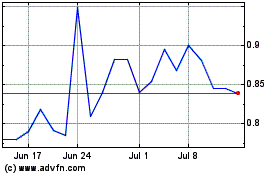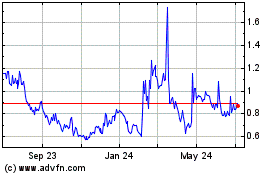WiMi Optimized Cloud Task Scheduling in Cloud Computing Using Group Intelligence Algorithms
February 01 2024 - 8:00AM

WiMi Hologram Cloud Inc. (NASDAQ: WIMI) ("WiMi" or the "Company"),
a leading global Hologram Augmented Reality ("AR") Technology
provider, today announced that it optimized cloud task scheduling
using group intelligence algorithms. A group intelligence algorithm
is a computational method based on the behavior of groups in
nature, which can demonstrate powerful search and optimization
capabilities in solving complex problems by simulating the
interactions and collaborations of individuals in a group. Using
group intelligence algorithms to solve cloud task scheduling
problems can improve task execution efficiency and resource
utilization.
Group intelligence algorithms are a class of
optimization algorithms that simulate the behavior of groups of
organisms in nature, such as ant colony algorithms and particle
swarm algorithms. These algorithms find the global optimal solution
by simulating the collaboration and competition mechanism of
biological groups. In cloud task scheduling, the use of population
intelligence algorithms can view tasks and resources as individuals
in a group, and find the optimal task scheduling solution through
collaboration and competition among individuals. This can fully
utilize the resources in the system, improve the task execution
efficiency, reduce the waiting time, and lower the energy
consumption and cost of the system.
Cloud task scheduling using group intelligence
algorithms can meet users' needs, improve the response speed of the
system, reduce the cost, and improve resource utilization. The
group intelligence algorithm can be applied to different aspects of
cloud task scheduling, such as task allocation, task scheduling,
and task execution.
For example, cloud tasks are scheduled using
particle swarm optimization (PSO). The PSO algorithm simulates the
flight behavior of birds in a flock by constantly adjusting the
position and speed of each bird in the flock to find the optimal
solution. In cloud task scheduling, each task can be considered as
a particle, the position of each particle indicates the virtual
machine to which the task is assigned and the velocity indicates
the execution speed of the task. By constantly updating the
position and velocity of the particles, the optimal task scheduling
solution can be found to improve task execution efficiency and
resource utilization. The particle swarm algorithm is an
optimization algorithm that simulates the foraging behavior of a
flock of birds. In cloud task scheduling, the task can be regarded
as the target that needs to be foraged by the flock of birds, and
the cloud computing resources are regarded as the path of the flock
of birds. The particle swarm algorithm searches for the optimal
task scheduling scheme by simulating the position and speed
adjustment of the bird flock during the search process.
Specifically, each particle represents a task allocation scheme and
adjusts its position and speed according to its own historical
optimal position and the flock's optimal position. The PSO
algorithm includes initializing the particle swarm, evaluating the
fitness, updating the speed and position, and updating the global
optimal solution and individual optimal solution.
First, a group of particles need to be
initialized, each representing a task scheduling scheme. Some
initial particles can be generated randomly or specified
empirically. For each particle, its adaptation value needs to be
calculated to evaluate its degree of superiority. The fitness value
can be determined based on the task completion time, resource
utilization, and other indicators. The higher the fitness value,
the better the task scheduling scheme for the particle. Then the
particle's speed and position are updated according to the
particle's current speed and position, as well as the global
optimal solution and the individual optimal solution. By adjusting
the velocity and position, the particle can move closer to the
global optimal solution to search for the optimal solution. For
each particle, its individual optimal solution and global optimal
solution need to be updated. The individual optimal solution is the
best task-scheduling solution in the history of the particle
itself, and the global optimal solution is the best task-scheduling
solution in the whole particle swarm. Using the PSO algorithm can
continuously search and optimize the cloud task scheduling scheme
to improve the performance and efficiency of the system.
About WIMI Hologram CloudWIMI Hologram Cloud,
Inc. (NASDAQ:WIMI) is a holographic cloud comprehensive technical
solution provider that focuses on professional areas including
holographic AR automotive HUD software, 3D holographic pulse LiDAR,
head-mounted light field holographic equipment, holographic
semiconductor, holographic cloud software, holographic car
navigation and others. Its services and holographic AR technologies
include holographic AR automotive application, 3D holographic pulse
LiDAR technology, holographic vision semiconductor technology,
holographic software development, holographic AR advertising
technology, holographic AR entertainment technology, holographic
ARSDK payment, interactive holographic communication and other
holographic AR technologies.
Safe Harbor StatementsThis press release
contains "forward-looking statements" within the Private Securities
Litigation Reform Act of 1995. These forward-looking statements can
be identified by terminology such as "will," "expects,"
"anticipates," "future," "intends," "plans," "believes,"
"estimates," and similar statements. Statements that are not
historical facts, including statements about the Company's beliefs
and expectations, are forward-looking statements. Among other
things, the business outlook and quotations from management in this
press release and the Company's strategic and operational plans
contain forward−looking statements. The Company may also make
written or oral forward−looking statements in its periodic reports
to the US Securities and Exchange Commission ("SEC") on Forms 20−F
and 6−K, in its annual report to shareholders, in press releases,
and other written materials, and in oral statements made by its
officers, directors or employees to third parties. Forward-looking
statements involve inherent risks and uncertainties. Several
factors could cause actual results to differ materially from those
contained in any forward−looking statement, including but not
limited to the following: the Company's goals and strategies; the
Company's future business development, financial condition, and
results of operations; the expected growth of the AR holographic
industry; and the Company's expectations regarding demand for and
market acceptance of its products and services.
Further information regarding these and other
risks is included in the Company's annual report on Form 20-F and
the current report on Form 6-K and other documents filed with the
SEC. All information provided in this press release is as of the
date of this press release. The Company does not undertake any
obligation to update any forward-looking statement except as
required under applicable laws.
ContactsWIMI Hologram Cloud Inc.Email:
pr@wimiar.comTEL: 010-53384913
ICR, LLCRobin YangTel: +1 (646) 975-9495Email:
wimi@icrinc.com
WiMi Hologram Cloud (NASDAQ:WIMI)
Historical Stock Chart
From Mar 2024 to Apr 2024

WiMi Hologram Cloud (NASDAQ:WIMI)
Historical Stock Chart
From Apr 2023 to Apr 2024
